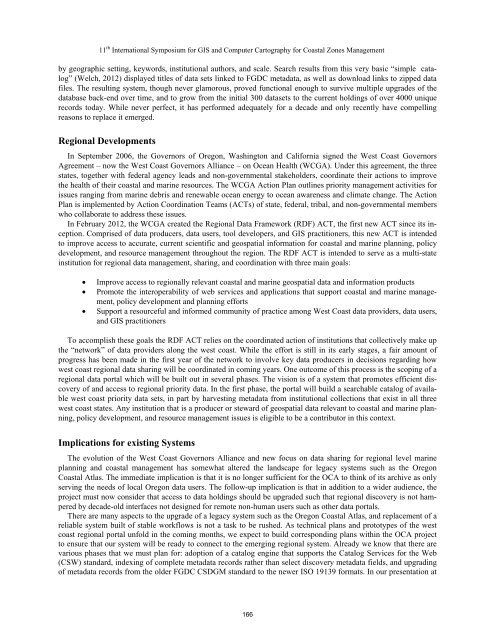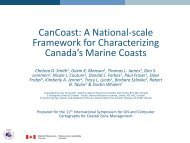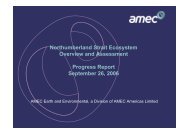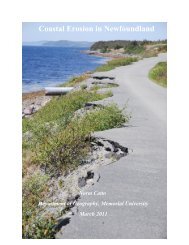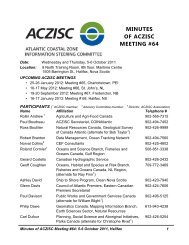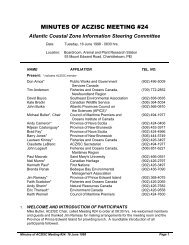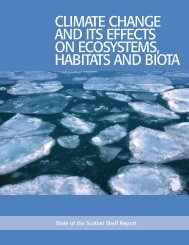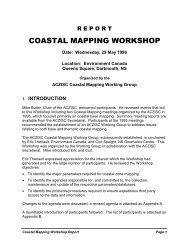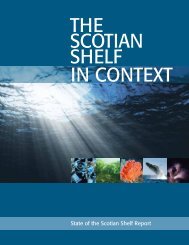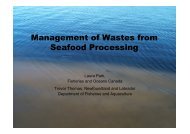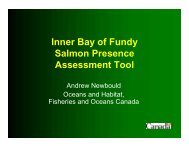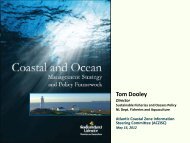Download PDF - COINAtlantic
Download PDF - COINAtlantic
Download PDF - COINAtlantic
- No tags were found...
Create successful ePaper yourself
Turn your PDF publications into a flip-book with our unique Google optimized e-Paper software.
11 th International Symposium for GIS and Computer Cartography for Coastal Zones Managementby geographic setting, keywords, institutional authors, and scale. Search results from this very basic “simple catalog”(Welch, 2012) displayed titles of data sets linked to FGDC metadata, as well as download links to zipped datafiles. The resulting system, though never glamorous, proved functional enough to survive multiple upgrades of thedatabase back-end over time, and to grow from the initial 300 datasets to the current holdings of over 4000 uniquerecords today. While never perfect, it has performed adequately for a decade and only recently have compellingreasons to replace it emerged.Regional DevelopmentsIn September 2006, the Governors of Oregon, Washington and California signed the West Coast GovernorsAgreement – now the West Coast Governors Alliance – on Ocean Health (WCGA). Under this agreement, the threestates, together with federal agency leads and non-governmental stakeholders, coordinate their actions to improvethe health of their coastal and marine resources. The WCGA Action Plan outlines priority management activities forissues ranging from marine debris and renewable ocean energy to ocean awareness and climate change. The ActionPlan is implemented by Action Coordination Teams (ACTs) of state, federal, tribal, and non-governmental memberswho collaborate to address these issues.In February 2012, the WCGA created the Regional Data Framework (RDF) ACT, the first new ACT since its inception.Comprised of data producers, data users, tool developers, and GIS practitioners, this new ACT is intendedto improve access to accurate, current scientific and geospatial information for coastal and marine planning, policydevelopment, and resource management throughout the region. The RDF ACT is intended to serve as a multi-stateinstitution for regional data management, sharing, and coordination with three main goals:Improve access to regionally relevant coastal and marine geospatial data and information productsPromote the interoperability of web services and applications that support coastal and marine management,policy development and planning effortsSupport a resourceful and informed community of practice among West Coast data providers, data users,and GIS practitionersTo accomplish these goals the RDF ACT relies on the coordinated action of institutions that collectively make upthe “network” of data providers along the west coast. While the effort is still in its early stages, a fair amount ofprogress has been made in the first year of the network to involve key data producers in decisions regarding howwest coast regional data sharing will be coordinated in coming years. One outcome of this process is the scoping of aregional data portal which will be built out in several phases. The vision is of a system that promotes efficient discoveryof and access to regional priority data. In the first phase, the portal will build a searchable catalog of availablewest coast priority data sets, in part by harvesting metadata from institutional collections that exist in all threewest coast states. Any institution that is a producer or steward of geospatial data relevant to coastal and marine planning,policy development, and resource management issues is eligible to be a contributor in this context.Implications for existing SystemsThe evolution of the West Coast Governors Alliance and new focus on data sharing for regional level marineplanning and coastal management has somewhat altered the landscape for legacy systems such as the OregonCoastal Atlas. The immediate implication is that it is no longer sufficient for the OCA to think of its archive as onlyserving the needs of local Oregon data users. The follow-up implication is that in addition to a wider audience, theproject must now consider that access to data holdings should be upgraded such that regional discovery is not hamperedby decade-old interfaces not designed for remote non-human users such as other data portals.There are many aspects to the upgrade of a legacy system such as the Oregon Coastal Atlas, and replacement of areliable system built of stable workflows is not a task to be rushed. As technical plans and prototypes of the westcoast regional portal unfold in the coming months, we expect to build corresponding plans within the OCA projectto ensure that our system will be ready to connect to the emerging regional system. Already we know that there arevarious phases that we must plan for: adoption of a catalog engine that supports the Catalog Services for the Web(CSW) standard, indexing of complete metadata records rather than select discovery metadata fields, and upgradingof metadata records from the older FGDC CSDGM standard to the newer ISO 19139 formats. In our presentation at166


